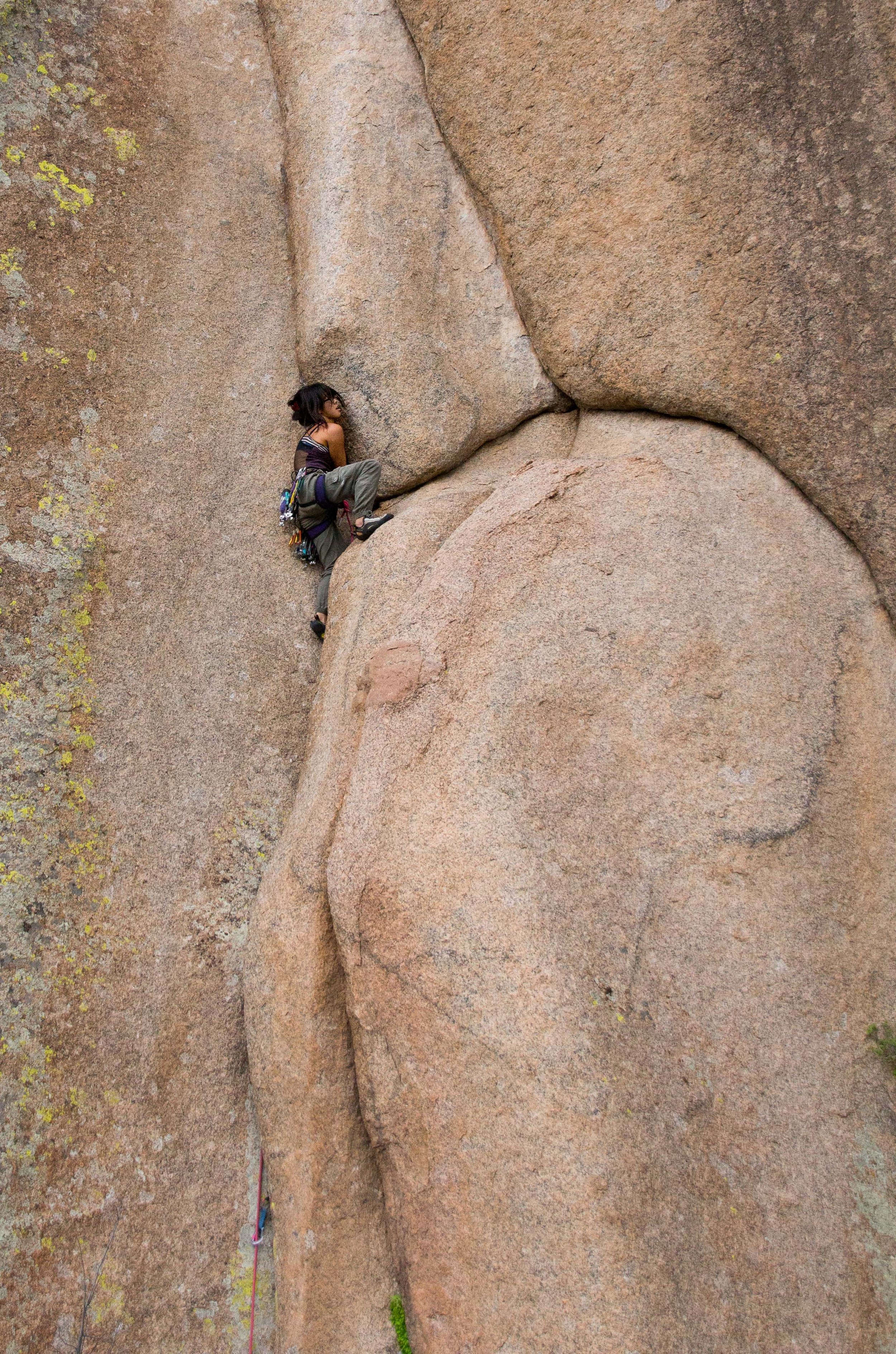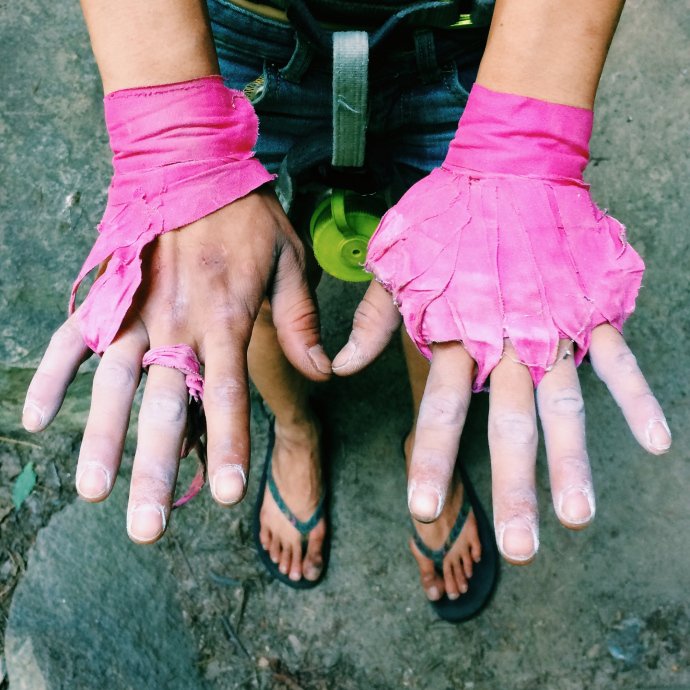Beacons of Badassery — Kathy Karlo
Kathy Karlo was the first badass woman who came to mind when I originally had the idea for this series. I discovered her blog, For The Love of Climbing, soon after I fell in love with climbing myself, and I instantly knew she was a kindred spirit. Her experiences were deeply resonant, and her way with words was inspiring. Plus, she seriously kicks ass climbing trad, which is something I have yet to try.
Kathy has often delved into the subject of being a female who climbs – her experiences in “The woman climber” and “Do not go outside to cry” ring so true to me – and I’m excited to share even more of her insights here.
Photo by Irene Yee (@ladylockoff)
How did you get started climbing?
I was dating this guy in NY about seven or eight years ago. He was from Colorado, and he and his father took me out ice climbing at the Ouray Ice Climbing Festival every January. I loved it.
I’d never actually rock climbed until about two years after, when we broke up, I moved to NYC and found myself needing something for myself. I found a job at a local gear shop and searched high and low for climbing partners, and I learned how to trad climb upstate in the Gunks shortly afterward.
Photo by Irene Yee (@ladylockoff)
Why do you love trad so much?
It was my first real introduction to rock climbing. My first time outdoors, my partner took me up multi-pitch after multi-pitch and I was enthralled with it more than anything else in my entire life. The feeling left me breathless.
I came home that day and told myself I wanted to learn how to lead, so I could be self sufficient. I didn’t know jack about climbing, but I knew that I loved it, and I was ready to learn.
Photo by Nick Lanphier
What inspired you to start For the Love of Climbing?
When I lived in NYC, I didn’t have a conventional job which meant I had a ton of time to get outside. I nannied, worked at a gear shop, and owned a nanny referral agency. I worked odd hours and usually had a string of three or four days off at a time, so I was always on the road (mostly on the east coast). I was obsessed and never home, unless I was working.
One weekend I stayed in Brooklyn, and I felt somewhat guilty for wasting a beautiful day kicking around the city, so I decided to start chronicling my travels. I called it “The day I quit rock climbing.” It was a way for me to keep friends and family in the loop about my whereabouts, but also a great emotional outlet for me.
Photo by Gašper Pintar
What scares you? How do you deal with fear when you’re climbing?
If you’d asked me a few years ago, I might have said falling or failing. I’ve since learned that failure is nothing to be afraid of. The only thing that will hold you back is not failing, doing nothing because you are afraid not to succeed. Falling still scares me a little.
Photo by Matthew Parent
What does strength mean to you, and how has your definition changed as you have evolved as a climber?
Strength is about experiences, and they’re usually hard ones. The kind that are painful and full of hard changes, but without them comes the absence of growth.
To have strength means to smash through brick walls and figure out how to get to the other side. It takes great fortitude. You don’t get there without a few growing pains, shedding some tears, and getting uncomfortable.
I used to think strength just meant keeping your head up and barreling through until you succeeded. I thought it was about having the bandwidth to get through difficult moments, but climbing has shown me (over and over again) that it’s so much more than that.
Photo by Mikaela Wegerhoff
You talk about the assumptions that get made about women climbers in your post, “The headache“:
“The assumption that day was that Sarah was just the girl and her partner, being male, had obviously led all of the pitches. That assumption was wrong. The assumption that in a climbing duo comprised of both male and female partners, the girl is ‘just the girlfriend’ and out for a fun day of toproping and not carrying the team is wrong and happens frequently.”
Things like this frustrate me so much, and I feel like this is the kind of subtle sexism that men don’t see. And this is one of the reasons I love climbing with other women – not because I don’t have lots of male climbing partners who support me, but because other women share these experiences, and we can talk about them, which helps me realize I’m not imagining these assumptions, and I’m not alone.
Now, women’s outdoor communities and events, like Flash Foxy and the Women’s Climbing Festival, REI’s Force of Nature, and No Man’s Land Film Festival are becoming hugely popular.
Why do you think it is so important for women adventurers to connect with other women? Do you think that these communities will help change the overall landscape of climbing and the outdoors as one that is dominated by men? What more can we do to encourage women in the outdoors and other traditionally male-dominated pursuits?
As a child, I didn’t grow up doing anything outdoorsy, and so I never really thought of the great outdoors being overly male or female. Introduced to climbing my twenties, it was simply “the great outdoors.”
But the more that I climbed, the more I discovered that the outdoors, just like femininity, was socially constructed. I’m reminded by this question of the saying: “Anything you can do, I can do bleeding,” meaning I quickly realized that my being a woman in no way, shape, or form would hold me back from success.
And then finding likeminded women to climb with along the way has been empowering for me. I have always felt like I can be myself when I’m with my climbing partners, whether they’re male or female.
When I’m feeling scared or insecure, I don’t try to hide it. I think that some people, especially women, feel pressured to remain stoic but we all have insecurities. I think they’re very, very relatable. “Oh, you were scared on that pitch too?” The same for celebrating each other’s success.
Bonding with other women in the outdoors over very real experiences IS a part of the experience. It’s important to find your people as you walk through life. Climbing and connecting with other women has helped build my support system, and with that in my corner, I feel like I can do anything.
We can’t forget that gender barriers exist. That’s like saying racism isn’t a problem. It’s here. It’s everywhere, even if we don’t personally experience it. Acknowledging gender barriers means we have the power to go beyond them — that’s going to be badass for the history of women in the outdoors. I’d personally love to see the first all female ascent team of the Dawn Wall on the news in the next decade, maybe less.
Encourage other women in the outdoors just by being yourself. By following your joys, trying hard, and keeping a positive attitude — people see that. Other women see that.
Because the thing about trying something that seemed impossible at one point is that when people see it, they get inspired to try, too. Instead of telling ourselves that we could never do that, we start thinking, “Maybe I can do that, too.”
So much love and appreciation to Kathy for her honest answers and for always sharing her stories!
Listen to Kathy’s “not a climbing podcast (well, sorta)” at fortheloveofclimbing.com.






